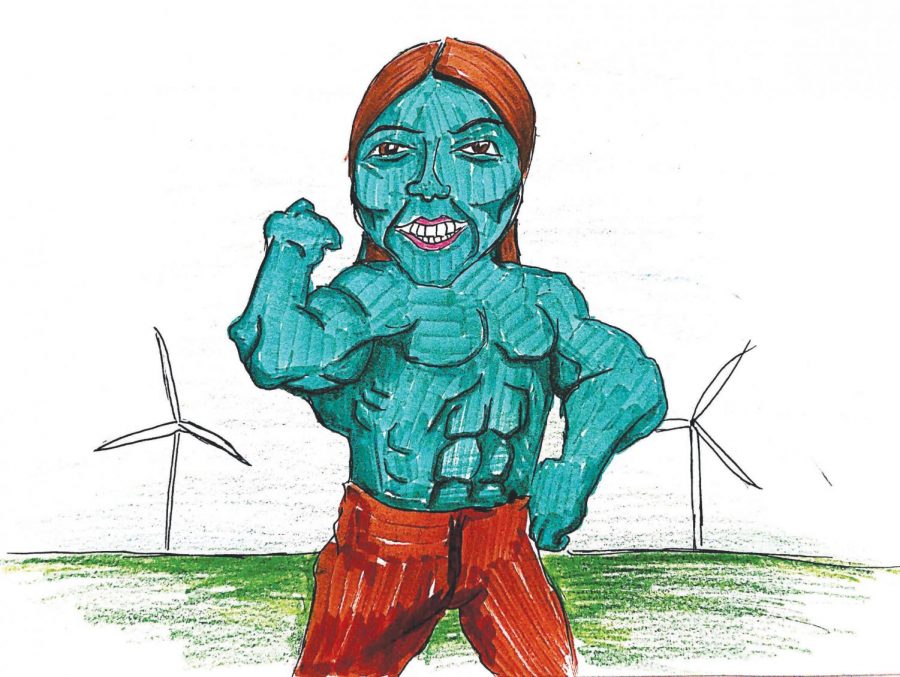Democrats: Plan, Don’t Dream
The controversial new member of Congress, Alexandria Ocasio-Cortez (D-NY 14th District), often referred to as AOC, unveiled a new resolution with Senator Ed Markey (D-MA) that vows to tackle climate change and economic inequality. Although climate change is a pressing issue that the government must take action to solve, the Green New Deal (GND) is not the solution.
The GND includes a ten-year-plan that envisions a future where the United States uses 100% renewable, zero-emission energy sources, and calls for the creation of millions of high-wage jobs to help eliminate poverty. It does not suggest placing new regulations on the energy-sector. Instead, it advocates for enormous public spending on wind and solar energy, energy-efficient buildings, and working with farmers to move toward more sustainable agricultural methods. The bill also contains a full range of progressive policies, including universal healthcare, ensuring all jobs are union-protected, and guaranteed housing, food, and family-sustaining wages for all Americans.
Tackling climate change is a vital issue, however, the GND errs when it veers from solely tackling climate change and includes other major economic reforms. Although a totally carbon-free and universally-employed population would be spectacular, the road to achieving a green country needs bipartisan cooperation. Pushing for fundamentally socialist ideals will only put conservatives in a defensive position and harm our ability to tackle climate change.
Many have compared AOC’s efforts to President Obama’s 2009 American Recovery and Reinvestment Act, which poured $90 billion into a range of green initiatives. Ocasio-Cortez and the most left-leaning Democrats are using the former president’s plan as a playbook for a much more ambitious deal. However, while Obama used green initiatives to stimulate the economy, AOC and other legislators of the GND are grafting their economic agenda onto a response to the climate emergency.
It is doubtful that this resolution will pass in Congress. Unlike under Obama, the Democrats no longer control the White House or the Senate, and President Trump’s attitude towards addressing climate change is extremely hostile. In a 60 Minutes interview, Trump implied that scientists who claim that global warming is harmful to the planet are paid by political interest groups.
Furthermore, how the country would pay for the GND is still unclear. Its supporters have brushed off concerns about cost. However, according to a study co-authored by the former director of the nonpartisan Congressional Budget Office, the estimated cost would be at least $93 trillion.
Ocasio-Cortez has called for raising the top marginal tax rate to 70% to help fund the GND. This radical idea has raised doubts in many Democrats, including Speaker of the House Nancy Pelosi (D-CA 12th District) who called the plan the “Green Dream.” Raising the tax rate so significantly is a poor way to raise revenue, because there is a limit to how much tax one can raise without hurting the economy as a whole.
France’s previous president François Hollande claimed that a 75% supertax would force the richest 1% to help the country out of an economic crisis. However, this move devastated the French economy: investors began pulling out of Paris, and there was a mass exodus of business leaders from the country. Many high-earning CEOs, actors, and even soccer players gave up their French nationality just to avoid the tax hike.
In the end, the supertax only raised €160 million ($182 million). Over the same period, the budget deficit soared to €84.7 billion ($95.7 billion). Cortez’s call for a 70% tax rate will only diminish support for the GND on both sides of the aisle. It is not a realistic or well-thought-out plan for the future.
Climate change is an important issue that affects every person in the world; it needs immediate action. The GND is shaped by admirable ideals of equality and would benefit the environment. However, for the GND to pass, liberal policymakers should focus only on decarbonizing the U.S. economy, rather than also pushing social policies that reduce support for the bill, no matter how desirable these policies may be.




